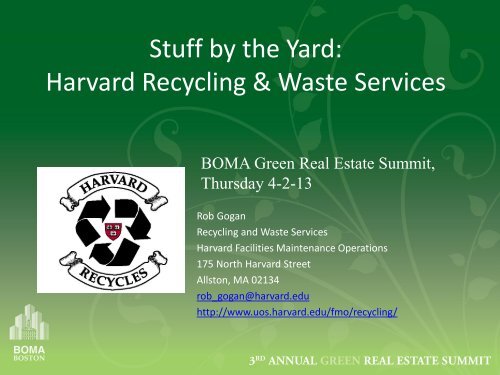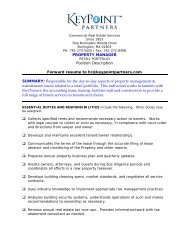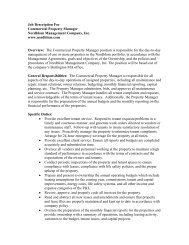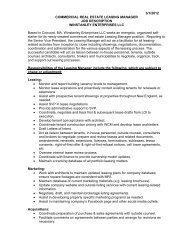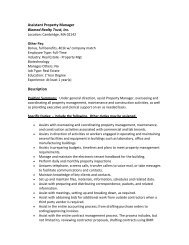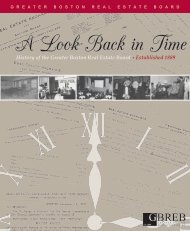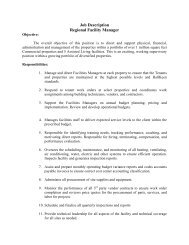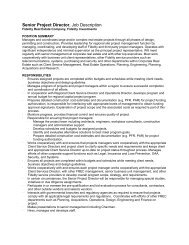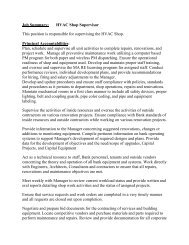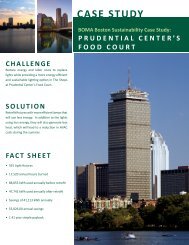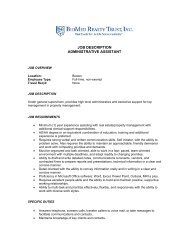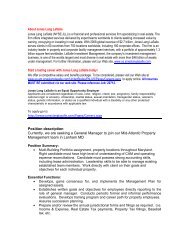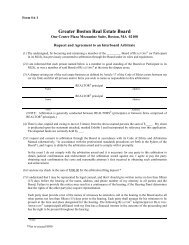Harvard Recycling & Waste Services - Greater Boston Real Estate ...
Harvard Recycling & Waste Services - Greater Boston Real Estate ...
Harvard Recycling & Waste Services - Greater Boston Real Estate ...
You also want an ePaper? Increase the reach of your titles
YUMPU automatically turns print PDFs into web optimized ePapers that Google loves.
Stuff by the Yard:<br />
<strong>Harvard</strong> <strong>Recycling</strong> & <strong>Waste</strong> <strong>Services</strong><br />
BOMA Green <strong>Real</strong> <strong>Estate</strong> Summit,<br />
Thursday 4-2-13<br />
Rob Gogan<br />
<strong>Recycling</strong> and <strong>Waste</strong> <strong>Services</strong><br />
<strong>Harvard</strong> Facilities Maintenance Operations<br />
175 North <strong>Harvard</strong> Street<br />
Allston, MA 02134<br />
rob_gogan@harvard.edu<br />
http://www.uos.harvard.edu/fmo/recycling/
Continental Army troops<br />
barracked here in 1775 &<br />
recycled roof flashing into<br />
bullets for the Battle of<br />
Bunker Hill.<br />
George<br />
Washington slept<br />
here.<br />
•Historic campus laid out on ox trails and Indian paths in 1636, first in Anglo<br />
America—no back alleys, few loading docks, few dumpsters allowable<br />
•500 buildings on 600 acres in Cambridge, <strong>Boston</strong> and Watertown<br />
•25,832 sq ft including 15,000 on main campus in Cambridge<br />
•Urban setting in most densely populated part of metro area of 3.5 million<br />
•25,062 FTE students + 16,114 FTE faculty and staff + 2,000 contractors (2010)<br />
•Built on Charles River flood plain with low elevation<br />
•$32 billion endowment 2010, biggest in U.S.
<strong>Harvard</strong> Campus Refuse, 2012<br />
Source: Vendor supplied scale weights, volume-to-weight conversions using <strong>Waste</strong>Wise standards<br />
• Basic Recyclables: 25% 3,677 tons<br />
• Composting: 20% 2,493 tons<br />
• Other recycling: 8% 1,101 tons<br />
• Residual Trash: 47% 6,719 tons<br />
• Total refuse 14,440 tons<br />
• Per capita trash 361 pounds<br />
• Per capita recycling 415 pounds<br />
• Average per-plate food scraps: < 2 ounces
<strong>Waste</strong> audits<br />
• Measure what’s<br />
actually in campus<br />
trash<br />
• Show students that<br />
food and recyclables<br />
are still wasted<br />
• Chart progress from<br />
year to year
Results of <strong>Harvard</strong> <strong>Waste</strong> Audit, 2011<br />
Random sample of <strong>Harvard</strong> dorm trash, which yielded by weight:<br />
41%<br />
COMPOST<br />
COMPOST<br />
ABLE<br />
38%<br />
Including 20% food<br />
REUSABLES 4%<br />
“TRASH”<br />
18%
President Drew Faust stands with Eco-REPs at Move-in 2010.<br />
Photo by Brandon Geller
<strong>Waste</strong> reduction (e.g. efficient procurement,<br />
reuse) saves hidden resources…<br />
• We only see the<br />
tip of the “<strong>Waste</strong><br />
Berg.” That’s why<br />
it’s much more<br />
effective for the<br />
campus to buy,<br />
use & re-use only<br />
what we need<br />
than to buy too<br />
much, even if we<br />
recycle or<br />
compost all<br />
14,000 tons of it.<br />
The goods & food<br />
we discard<br />
ourselves—1<br />
T/person<br />
The waste<br />
generated to<br />
create them<br />
(mining ore,<br />
petro-chemicals,<br />
forest products,<br />
mercury, lithium,<br />
water), transport<br />
them and package<br />
them—and the<br />
resources saved if<br />
reuse makes<br />
purchase<br />
unnecessary—est<br />
200,000 lbs per<br />
capita
…Make it convenient…<br />
SingleStream<br />
RECYCLING<br />
Recycle It<br />
Together<br />
Recycle all papers, books, mail,<br />
magazines, cardboard, paper hot<br />
cups, metal cans & foils, plastic<br />
and glass bottles, jars, cups &<br />
containers mixed together in the<br />
same bins, bags and barrels. No<br />
loose bags, no styrofoam, no<br />
tissues, no napkins, no trash.<br />
Thanks for reducing, reusing and recycling! Please call<br />
<strong>Harvard</strong> FMO <strong>Recycling</strong> & <strong>Waste</strong> <strong>Services</strong> if you have any<br />
questions at 617-495-3042
…Make it fun…<br />
FAS FreeCycle<br />
World record box fort, Sept 2012<br />
“Opt out of Junk mail” party<br />
Partnerships with student<br />
Environmental Action Committee
Community Based Social Marketing<br />
• HLS Earth Day fair<br />
• Green Teams: Holyoke<br />
Center FreeCycle<br />
• CERToon competition:<br />
James Powers ‘08
“Mount Trashmore” – one day’s trash from <strong>Harvard</strong><br />
Yard. Box on top depicts how high heap would be<br />
without recycling. Photo by Colin Durrant
<strong>Harvard</strong> Office for Sustainability<br />
•Eco-REPs promote waste<br />
reduction and recycling<br />
•Green Office program<br />
promotes thriftier<br />
procurement, resource<br />
sharing, recycling beyond<br />
basics<br />
•FAS Green Program<br />
sponsors FreeCycles<br />
•HLS, HBS promote waste<br />
reduction in Grad Schools<br />
•Construction & demolition<br />
recycling over 99% for<br />
LEED points
2012 Ivy League Gorilla Prize<br />
(Pounds recycled)<br />
1 <strong>Harvard</strong> University 910,900 lbs<br />
2 UPennsylvania 19 589,800<br />
3 Cornell University 22 561,692<br />
4 Brown University 93 192,720<br />
1 Marist College 0.713<br />
2 University of Colorado at Boulder 0.153<br />
3 <strong>Harvard</strong> University 0.132<br />
4<br />
EPA GameDay Challenge<br />
2011, Organics Diversion<br />
Campus Sustainability Initiative-<br />
UMassachusetts Amherst<br />
0.082<br />
5 University of California, Davis 0.079<br />
EPA “<strong>Waste</strong>Wise”-sponsored 10-<br />
week contest with 604<br />
campuses participating in<br />
2012. See<br />
Food <strong>Waste</strong> Audit charts drop in<br />
post-consumer food scraps<br />
Per plate waste drop: from 5 ounces/meal to
<strong>Harvard</strong> Donations 2011<br />
•Diversion of 709 tons from disposal<br />
•Donation of over $2,500,000 worth of reused<br />
furniture, clothing and books to non-profit<br />
organizations and needy individuals<br />
•Assistance to over 100 <strong>Harvard</strong>, Massachusetts<br />
and overseas charities<br />
•Raising $102,000 for seven student organizations<br />
•Vocational training to 25 special needs high<br />
schoolers
Partnerships with Charities<br />
Habitat for Humanity officers help sort mountains of<br />
move-out goods donated for annual “Stuff Sale.”<br />
Sales in ’11 exceeded $100 K.<br />
Above, “Lulu” from<br />
the Cambridge Family<br />
Shelter appreciates<br />
getting cosmetics<br />
from the Valentine’s<br />
Day Cosmetics Drive.<br />
Below: HBS student<br />
Jenny Liu and staff get<br />
ready for the party:<br />
800 lbs of donations in<br />
’10.<br />
Volunteers from Tomasello Boxing Club pick up<br />
<strong>Harvard</strong> Athletics surplus fitness equipment.
City of Cambridge Collaborations<br />
• Participant on Cambridge <strong>Recycling</strong> Advisory<br />
Committee, established by 1991 Cambridge<br />
<strong>Recycling</strong> Ordinance<br />
• Participant in Cambridge Climate Protection Plan<br />
• Donation of over $2,000,000 worth of reused<br />
furniture, clothing and books to over 150 nonprofit<br />
organizations and needy individuals<br />
• Cambridge Science Festival, “Earth Day<br />
<strong>Recycling</strong>”, 2012
City of Cambridge dedicates the<br />
corner of Brattle & James St. in<br />
Scott’s memory, May 2003.<br />
“Reduce, Reuse, Recycle.”<br />
Scott Sandberg (with daughter<br />
Jesse & Mayor Gallucio), Radcliffe’s<br />
“<strong>Recycling</strong> King,” 1970-2002
Off-Campus Student Donation Station
Move-out goods destinations<br />
Clothing & shoes sold at<br />
textile broker to benefit<br />
HHH, Alternative Spring<br />
Break, <strong>Harvard</strong> Taiwan<br />
Leadership Conference<br />
Upholstered furniture all sold at Stuff Sale. Futons, couches and<br />
upholstered chairs especially popular. Caution: Bedbugs<br />
Non-perishable food items go to<br />
local homeless shelters, food<br />
pantries, <strong>Greater</strong> <strong>Boston</strong> Food<br />
Bank, Lovin’ Spoonfuls.<br />
Cosmetics, cleaning supplies go<br />
to local women’s shelter, Haiti<br />
Ecole Polyvalent<br />
Office furniture sold at Stuff<br />
Sale or given to charities<br />
(Houses of Worship, schools,<br />
municipal offices<br />
Mattresses go to Ecole<br />
Polyvalent, Institution <strong>Recycling</strong><br />
Network ( 5 containers to Sierra<br />
Leone, Nicaragua, Grenada).<br />
Rugs: handmade oriental<br />
rugs sold separately;<br />
machine rugs: Smaller<br />
than 3’ x 5 sell well;<br />
larger iffy; room-sized<br />
hard to sell. Unsold<br />
donated to Haiti<br />
Earthquake relief (they<br />
loaded and took away).<br />
Pillows:
The Stuff Sale<br />
Rented 20 x 20 tent shelters cashier table<br />
and “Reserved/Paid” stash, and provides<br />
shelter for overnight “circle the hampers”<br />
unsold goods. Blue hampers, pallet<br />
jacks, pallets supplied by <strong>Harvard</strong><br />
<strong>Recycling</strong>. Police detail, Events Office<br />
permission, <strong>Harvard</strong> <strong>Recycling</strong> deliveries<br />
of goods (up to 10 truckloads) per day.<br />
First day sales at Move-in 2011 Stuff Sale:<br />
$15,000 cash + $3,500 checks & charges.<br />
Best customers: Parents of freshmen,<br />
freshmen and their room mates,<br />
sophomores furnishing suites,<br />
international graduate students,<br />
antiques/furniture collectors ,<br />
neighbors, non-profit organizations
Surplus Distribution<br />
<strong>Harvard</strong> Free Surplus Furniture<br />
Distribution, every Thursday from 11 AM<br />
- 2 PM, 175 North <strong>Harvard</strong> Street, Allston<br />
MA.<br />
Depending on weather and advertisement<br />
(<strong>Harvard</strong> <strong>Recycling</strong> Update, craigslist), up<br />
to 200 visitors have come at once.<br />
Caution: Liability– need for parking monitor,<br />
“Safety Speech,” registration, queue with 3-<br />
second delay between entrants<br />
Visitors eagerly await arrival of fresh<br />
truckloads.
Dormitory beds sent to El Salvador orphanage<br />
via Food for the Poor and Institution <strong>Recycling</strong><br />
Network…<br />
…More dorm furniture being<br />
unloaded in Nicaragua.
LABBB/Semi-New Computers<br />
LABBB special needs students of high<br />
school age get vocational training<br />
refurbishing and repairing surplus<br />
desktop PC’s from <strong>Harvard</strong>. Program is<br />
entirely self-supporting through sales<br />
by Semi-New Computers.<br />
Alison Rogers ‘04, Esther Tian ‘05 and<br />
others teamed up to help found<br />
computer refurbishing store which<br />
eventually became Semi-New<br />
Computers on <strong>Harvard</strong>’s Allston<br />
campus. <strong>Harvard</strong> PC’s have data<br />
erased, get refurbished and are sold to<br />
non-profits, students, and members of<br />
the community.
Quad Bikes<br />
QB has helped reduce abandoned bikes on campus<br />
dramatically. CommuterChoice works with HUPD to<br />
limit liability for cutting and seizing these for<br />
refurbishing and reuse. Their removal enhances<br />
campus esthetics and opens space for active bike<br />
riders. <strong>Harvard</strong> <strong>Recycling</strong> picks up seized bikes and<br />
recycles unusable parts through Surplus<br />
Distribution. Photo by Kris Locke.<br />
Left, JC Agudelo ‘03, helped Tim Ledlie ‘03 found<br />
QB in 2002. Photo by Rose Lincoln.
Valentine’s Day Cosmetics Drive<br />
Collection of unused<br />
cosmetics & toiletries<br />
co-sponsored by Eco-<br />
Rep program benefits<br />
women’s shelter.<br />
Lulu & friends are<br />
looking pretty!<br />
Average delivery:<br />
1,800 pounds REP donors enjoy helping. One<br />
volunteer, an expert<br />
manicurist, now comes every<br />
year to do all the women’s<br />
nails. Valentine’s Cosmetics<br />
Drive & Party is an annual<br />
fixture on both REP and shelter<br />
calendar.
Surplus diverted from disposal<br />
FY12<br />
Tons<br />
Computers refurbished & sold (Semi-new Computers) or donated 29<br />
Move-out furniture /clothing/books (220 truckloads) 192<br />
Office furniture, supplies, appliances for reuse 281<br />
Mattresses/IRN 6<br />
Food, cosmetics, cleaning supplies 2<br />
Non-perishable food 1<br />
Servable meals to <strong>Greater</strong> <strong>Boston</strong> Food Bank 200<br />
TOTAL 711
Elements of success in donations<br />
to local charities<br />
•Keep requests from charities and needy individuals and when<br />
the goods arrive, give them a special opportunity to pick up<br />
(generally requires a truckload)<br />
•Be flexible on pickup times as charities often have trouble<br />
getting a vehicle<br />
•Be prepared to offer lift gate help, loading labor<br />
•Ask for thank-you letters to shore up political support for<br />
program<br />
•Offer precise inventories with brand and model names<br />
• Caution: require receiving charities to specify what they need so you<br />
can call them if we receive it. If you don’t do this, they will want to<br />
come every week and take up your time shopping around.
Composting replenishes campus soils<br />
Decomposed remnants of plants and foods created through the<br />
management of heat, moisture, and aeration
Compost Tea<br />
Specific liquid biological amendment made by coaxing the beneficial<br />
organisms from composted landscape waste into an aerated water<br />
solution with various food sources.<br />
Below: T Fleischer, Wayne Carbone, compost tea brewer. Photo by Mike Conner
Organic Landscape Maintenance
Pick-up & Commercial Composting Off-campus<br />
•Many farmers do not want<br />
“compostable” flatware, even if<br />
certified by BPI<br />
•Prepare to pay more to deliver<br />
compostables which include<br />
serviceware<br />
•Try to find local sites to receive<br />
food scraps, or at least find ways<br />
to incorporate composted food<br />
scraps into local soils
Hybrid refuse removal: <strong>Harvard</strong> and<br />
contractor partnership<br />
• Mini-packer tipping system<br />
keeps our trucks on<br />
campus, not stuck in traffic<br />
or waiting in line<br />
• Contractors use CNG and<br />
BioDeisel to reduce<br />
emissions and noise<br />
• Vendors bring access to<br />
compost, recycling and<br />
landfill sites that <strong>Harvard</strong><br />
need not maintain
Refuse removal: Elements of Success<br />
• Keep custodians, kitchen staff, and landscapers aware of<br />
recycling specifications and procedures<br />
• Market waste reduction opportunities peer-to-peer<br />
• Keep clean, well-maintained trucks and equipment<br />
• Remove refuse promptly (but not too early), especially when<br />
buildings need special help, e.g. Move-out, annual events<br />
• Be loyal to your contractors and build partnerships<br />
• CAUTION: Remember that Zero <strong>Waste</strong> is the goal. Don’t be a<br />
waste enabler by building an efficient removal system<br />
(although you have to give the customers what they want)<br />
without paying attention to waste reduction, or local reuse or<br />
recycling options.
Teamwork with Custodians<br />
• Ergonomic design of receptacles<br />
and collection systems<br />
• Clear signage & convenient<br />
receptacles at point of waste<br />
generation<br />
• Restrictor lids to train<br />
generators not to contaminate<br />
recycling or compost<br />
• Training occupants via Green<br />
Teams<br />
• Procurement of recyclables/<br />
compostables<br />
• Prompt, reliable removal service<br />
• Blue bags for recycling
<strong>Harvard</strong> <strong>Recycling</strong>, 1989-2012<br />
1989 2012<br />
• Trash tonnage 10,800 6,719<br />
• <strong>Recycling</strong> 52 3,677<br />
• Compost 0 3,187<br />
• Per Capita trash (est) 600 lbs 361 lbs
With good planning, infrastructure, partnerships<br />
and peer marketing…
…even crusty old John <strong>Harvard</strong> can learn how to be green<br />
while conserving natural resources, helping his younger<br />
neighbors and feeding local soils.


